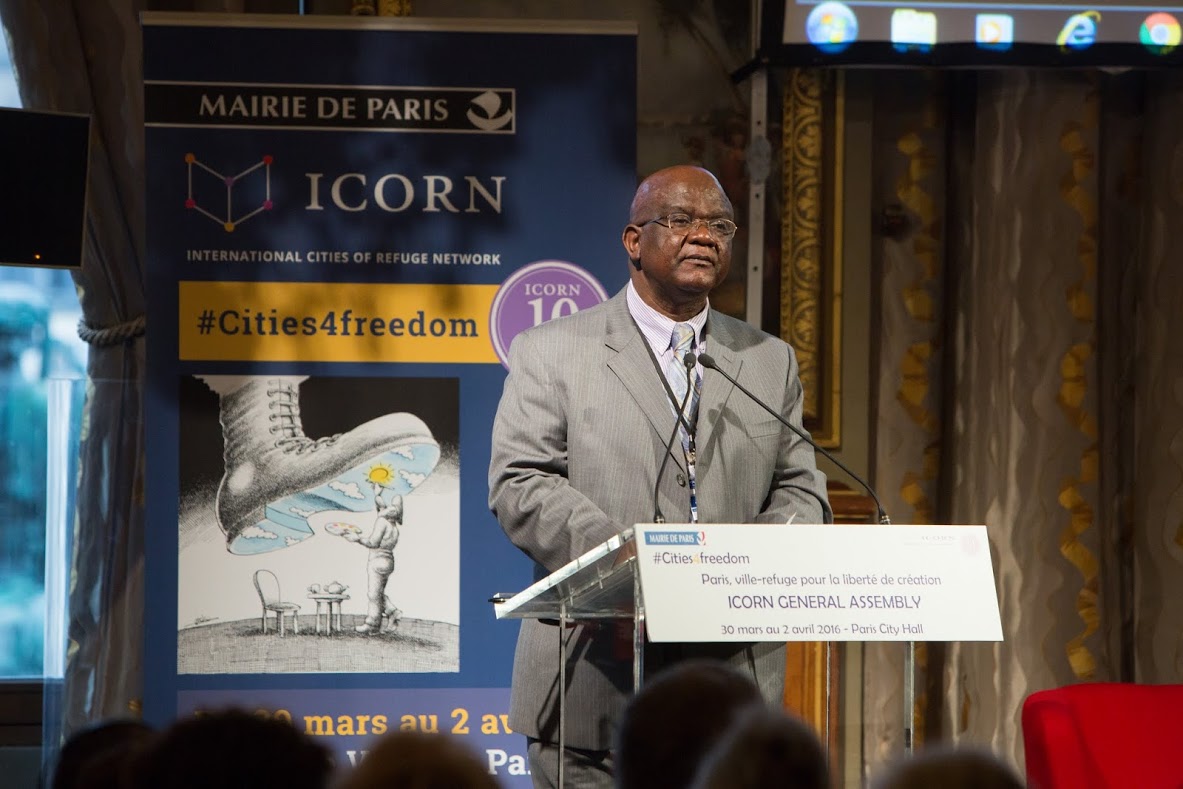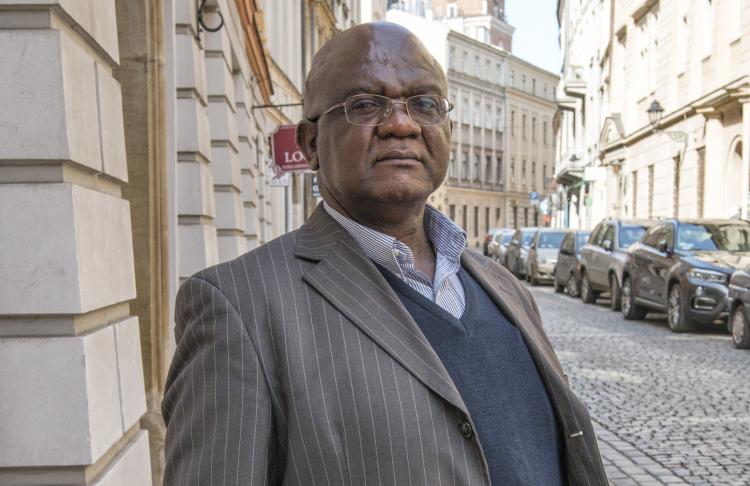Felix Kaputu: In Congo, teaching, writing and thinking are open doors to prison
Kaputu was released from the Congo prisons after enormous international pressure from the media and Amnesty International, and left the DRC through pressure from Scholars at Risk.
Felix Kaputu is a university professor in literature and culture, and a writer of fiction and non fiction, specialized in African studies, art, and philosophy. With a doctorate in English literature from the University of Lubumbashi, DRC, Kaputu has held numerous teaching and research positions both in the DRC and overseas, including the USA, Japan and Belgium. He has written six books on issues that include HIV/AIDS and women’s rights in Africa. His most recent publications are in the area of fiction and include the novels K-triangle de la mort: Descente aux Enfers (Presses Universitaires du Nouveau Monde, 2013), Power: Exquisite Meat (Xlibris, 2011) as well as Jo-Mary: Black Free Slave (Xlibris, 2010).
After a conference travel to Japan in 2005, Dr. Kaputu was summoned to a meeting with the principal of the university where he was teaching, the Lubumbashi University in Kinshasa. He was instead interrogated by a general. Accused of participating in a separatist group and of violating national security in Congo, he was subsequently detained illegally. He believes he was arrested on government orders as a warning to academics and intellectuals to remain silent in the run-up to the 2006 elections, among other reasons. Scores of other people, including opposition leaders and doctors, were arrested in Lubumbashi and the capital Kinshasa around the same time in connection with the alleged secession plot. Dr Kaputu was told he faced a prison sentence of 30 years or death if convicted.
Dr Kaputu was detained for 10 days in a local security cell, and then transferred to the notorious Centre Péniticiaire et de Reéducation Makala in Kinshasa, some 2,000 km from his home, where he spent just over four months. Prison conditions were extremely poor.
Following pressure from Amnesty International, the media and fellow academics, Dr Kaputu was given conditional release but was initially obliged to stay in Kinshasa. When he was eventually allowed to return to Lubumbashi as a result of further international pressure, he reportedly found himself under constant surveillance and unable to return to the university where he had worked. He went into hiding and ultimately decided to leave the country.
In August 2006, Dr Kaputu travelled to the USA under the Scholars at Risk (SAR) programme and taught at Harvard University (2006–2007) and Purchase College, State University of New York (2007–2008). He then became lecturer and researcher at the International Research Centre for Japanese Studies in Kyoto, Japan (2008-2009), after which he took up teaching at the Massachusetts College of Art and Design, USA. Before he arrived in Krakow this year, he held a position as visiting Scholar: Professor at Ghent University (Belgium) at the faculty of Arts and Philosophy.

Felix Kaputu joined us at the ICORN General Assembly in Paris this spring, where he told us « what happens to you when you are sent to the most horrible prison of your country ». Here is his testimony:
What happens to you when, on a given morning, you are sent to the most horrible prison of your country—a prison reserved for criminals—automatically making you a member of the criminal teams?
What happens to you when you manage to live with these criminals in jail and face death at every minute of your life? What happens when, despite your survival, you only end up facing your country institutions treating you as the most dangerous criminal of all time just because throughout your life you lived by ethical standards, stood by the youth, and wanted to show them the ways for their social growth and true success?
What happens to you when, after spending months in prison, international pressure opens the prison doors but all internal, national doors automatically close to you? All your friends close their doors too. All your family members are afraid to show up. Everybody in your country is afraid that coming close to you could mean prison or death.
What happens to you when you notice that your brain is sent to an everlasting prison? You cannot think; you cannot use your brain to produce anything personal or intelligent. You cannot think anything worthy of the training of your entire life.
You become disillusioned as you lose all your landmarks. The world becomes meaningless because you cannot count on it. You do not know it. You think it is too dangerous to learn, and must necessarily contain people similar to those you have met in your country and in prison. They will contribute to making your life a hell where migraines, nightmares, and high blood pressure become your only daily activities.
Teaching, writing, and thinking have become equally dangerous and the open doors to prison if not to death. Psychologically, you cannot develop anything besides frustration, and you experience the quick death of all the mental faculties that once made you an intellectual, an academic, a writer, and an artist. If only you could order your brain to stop functioning.
What happens when you cannot rely on any colleague in your country? When darkness means danger is close by? When spending nights in a house becomes dangerous, and you prefer to spend a couple of nights in a safe cemetery with phantoms? Many people, including security agents, are afraid of graveyards, especially when they know that innocent people have been forced to “rest in peace” there! Indeed, the place is peaceful.
Such was my situation when I was suddenly arrested on false accusations and sent to prison for months, condemned for an attempt on national security. Apart from criminals, I had to spend time with big rats with glaring eyes at night coming to check on me while waiting for the minute I would be dead, when they could happily feast on my corpse.
I spent months in a concrete box with a leaking roof filling the cell with brackish water. In that cell, it was impossible to sit down, impossible to stand up. The walking corpse was incapacitated. The only visible light could be perceived at night through the glaring eyes of the big rats.
When food came from the outside, it disappeared as soon as it had reached the door of the prison. It was given another direction, as the jail security needed food and never had enough.
Quickly, fleas infested the clothes that had become dirty beyond any imagination and engaged in sucking blood, holding a conversation of a specific kind with the body. In these conditions, life and death became one and the same. In these circumstances, despair was soon to invade me and to cancel hope.
For writers under such circumstances, ICORN becomes a shining star that shows the right direction and brings the resurrection of all mental capacities. This story could take long minutes, and could even have different episodes for telling it in those past nights in Africa around a fire. Here we are, with a shortened version. Horror can be summed up, but gratitude and hope rebuilt will still have opportunities to be repeated and addressed to exceptional people like you. You are ICORN, and ICORN means life for many.
Latest news
-
23.04.24
-
18.04.24
-
04.04.24
-
26.03.24
-
21.03.24







